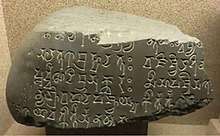Nagajari-Khanikargaon rock inscription
The Nagajari-Khanikargaon rock inscription is a 5th-century land grant discovered in the Nagajari area of the Golaghat district.[1] The artifact is fragmentary, with inscriptions in Sanskrit written in the eastern variety of the Brahmi script.[2] In style, language, and script, the inscription is very similar to the Umachal and Barganga rock inscriptions. This is the only inscription among the Kamarupa inscriptions that distinguishes between the b (ব) and v (ৱ) letters. Additionally, since it betrays no influence of a local Prakrit, this inscription is often placed earlier than the Umachal rock inscription. It also avers to the fact that Aryan culture had spread to the Golaghat region by the 5th century.[3]

Text
The text is fragmentary, with no complete sentence available, though it is believed it was written in the sloka meter.[4] Since the text is fragmentary, no English translation is available. Nevertheless, it is ascertained that the inscription is related to a grant of land, with the area bounded by "Dibrumukkhada" (a water body) in the east and a Banyan tree in the west.
Discovery
The rock inscription was collected by Luduram Saikia of Khanikargaon among some ruins in the Nagajari area prior to 1972. Around 1972, this stone fragment was noticed by M K Saikia at Saikia's residence, when it was reported.[5]
Notes
- (Sharma 1978, pp. 303-305)
- (Sharma 1978, p. 303)
- (Sharma 1978, p. 305)
- (Sharma 1978, p. 304)
- (Sharma 1972, p. 303)
References
- Sharma, Mukunda Madhava (1978). Inscriptions of Ancient Assam. Guwahati, Assam: Gauhati University.CS1 maint: ref=harv (link)